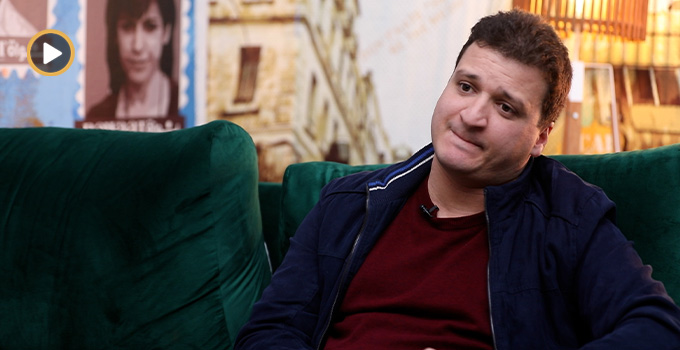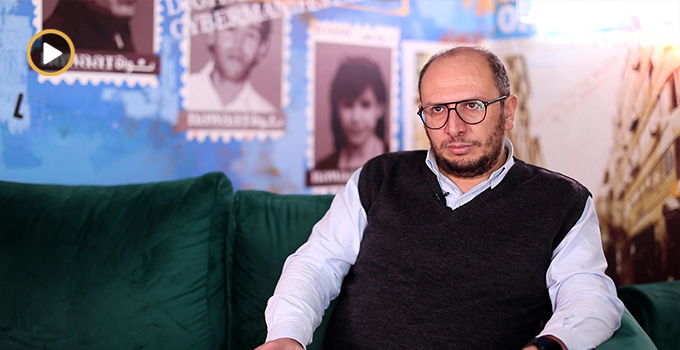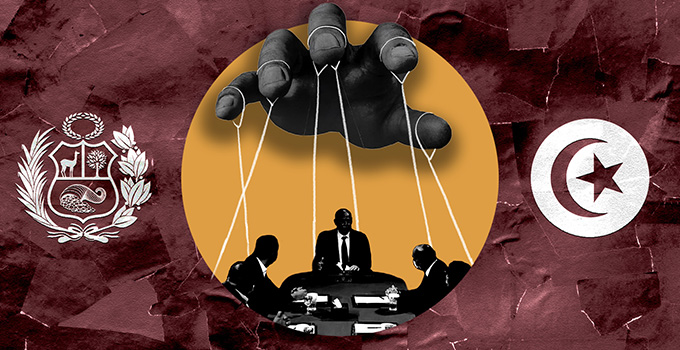Thick black smoke rises up from a burning barricade set out in the middle of the street. In the neighborhood of Souihel, youth have gathered to protest following the disappearance of a boat and its passengers at the end of September. The boat departed from Zarzis and was to make its way towards Italy. « A number of people who were from here died », reports Ahmed (a pseudonym), who is stopped on his bike. « They were our friends », he laments.

With tensions running high, spontaneous protests have formed elsewhere throughout the city. Downtown, young men have blocked streets with burning tires. In front of the municipality building, fishermen and relatives of those lost at sea demand explanations from authorities regarding the circumstances of the wreck and the bodies which remain unidentified. Families want to know the truth about their children’s disappearance. Most of them still do not know what happened to their relatives, nor where their bodies are to be found.
Fishermen, the first responders
On the morning of September 21, the boat carrying 18 passengers departed from the Tunisian coast and headed towards Europe. A couple days passed without any news. Alarmed, their families took action. « We were contacted by the families on September 23 », recounts Hela who is a member of the Alarm Phone network, an emergency phone number for persons in distress at sea which operates 24/7.
We immediately reached out to the Tunisian Coast Guard and the MRCC [Maritime Rescue Coordination Centre] in Tunis and Rome. We gave them all the information we had and asked them to carry out a search operation. But we didn’t receive any response
Hela relates.
After families sounded the alarm, fishermen were the first to react. Without any concrete action taken by the authorities, fishermen set out in search of bodies lost at sea, putting their livelihood on hold.
It’s a big deal, a real political act. It’s a form of self-governance, citizens are taking it upon themselves to organize,
says Walid, a denizen of Zarzis.
Since 2011, fishermen in the area have often found themselves on the front line of rescue missions to save migrants in distress at sea. Some have been through a specific training program provided by Doctors Without Borders and the Red Cross. In August 2018, six of them including Chamseddine Bourassine, president of the Fishermen’s Association of Zarzis, were arrested close to the Italian island of Lampedusa after having towed a boat carrying migrants in distress.

« We headed out towards Djerba and beyond towards Kerkennah », recounts Bourassine. On October 10, the fishermen found eight bodies off the Tunisian coast, but were unable to determine whether or not these were the passengers who had set off on September 21. « The bodies had been at sea for at least two weeks. They had decomposed », says one witness. After several days, the fishermen finally abandoned their search. We looked everywhere—it’s no use », sighs one fisherman.
In addition to the bodies discovered by the fishermen, three others were found on the country’s southern coastline. On October 5, the body of a woman was found on a beach on the island of Djerba. The woman was formally identified as Malek by her relatives who recognized the bracelet she was wearing. Her presence confirmed the wreck.
Burials authorized—without prior DNA testing
In Souihel, Karim is sitting at a cafe a few dozen meters from the barricades. His gaze distant, he lights a cigarette. A native of Zarzis, Karim is mourning the loss of his wife and daughter who disappeared in the wreck. He lives in Italy where they were supposed to join him. When he heard the news, he returned home to look for them.

« They bury people without even knowing who they are », he cries, outraged. At least four bodies were buried, without a prior DNA test or the possibility for families to identify them, in the Jardin d’Afrique cemetery. Ezzeddine Khelifi, delegate of the city of Zarzis, confirmed the information: « The authorities did not carry out any analyses to identify the bodies because their families thought that their children were still alive », Khelifi explains in defense, adding that the public prosecutor had authorized the burials.
The Jardin d’Afrique cemetery is generally reserved for unknown persons and foreigners who are buried there unidentified. « It’s not fair for anyone, whether Sub-Saharan, Tunisian or Syrian » Karim laments. His wife’s body was finally identified in Gabes, but he remains without news of his daughter. For the other families, the wait and lack of information is simply unbearable.
The latter requested that the bodies be unearthed so that DNA testing could be carried out. The authorities, under pressure, ultimately acquiesced. Coroners are in the process of attempting to identify the bodies. According to the results of DNA tests on the bodies as well as on the victims’ families, three of the four individuals who had been buried at Jardin d’Afrique were involved in the wreck on September 21, the TAP Agency reported on October 14.
Fingers pointed at authorities
In hopes of locating the bodies of their relatives so that they may properly grieve their loss, families are demanding clarifications from the authorities. « Why can’t they hold a press conference every day at a given time to share with us whatever information they have? » asks the member of one grieving family before the municipality of Zarzis. « This situation in which the authorities do not share any information only makes things worse and provokes families’ anger, which is understandable », observes Hela.

The lack of information also contributes to the spread of rumors. In Zarzis and on social media, rumors circulate regarding the number of bodies located, the progress of search operations and authorities’ responsibility in the wreck. The incapacity of the latter to carry out search operations is widely criticized.
It’s a prerogative of the government, and yet it is citizens—fishermen, specifically—who have taken it upon themselves to accomplish this mission. It’s not the first time that fishermen find themselves in this role. In December 2021, they also went out to search for persons lost at sea,
Hela recalls.
Young people across the city have also mobilized. Outside places of authority such as the municipality, the National Guard and police stations, barricades of burning tires and debris occupy the street, day and night.
It is a symbol of the general anger that is burning throughout the city. Indeed, despite public announcements made by the authorities, the governor of Medenine, Saied Ben Zayed, as well as the delegate of Zarzis, Ezzeddine Khelifi, were chased out of the city on October 14, under a rain of insults and stones.





iThere are no comments
Add yours